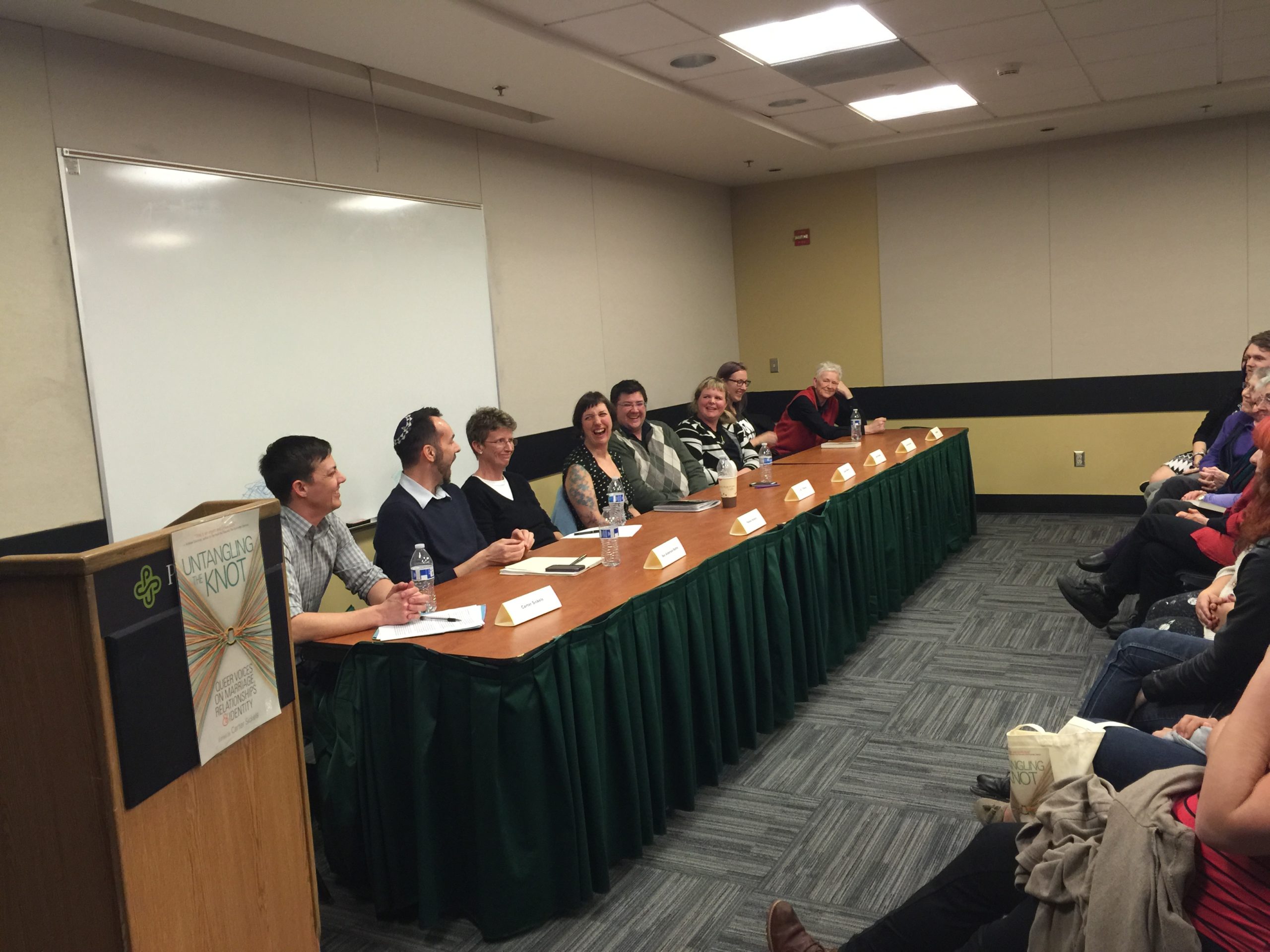On March 5, 2015 at Portland State University, Ooligan Press celebrated the launch of its most recent publication, Untangling the Knot: Queer Voices on Marriage, Relationships & Identity, a compendium of personal and political essays by twenty-six modern LGBTQ writers. Editor Carter Sickels, Lambda award-winning author of The Evening Hour, moderated a series of breathtaking readings by seven of the contributors to Untangling the Knot.

The essayists read excerpts to a rapt audience of over one hundred guests, who afterward asked the authors questions ranging from whether they felt compelled as authors in the LGBTQ community to be activists, to whether terms now used to describe the LGBTQ population are reductive or expansive, and what it was like to publish as a collective of voices on LGBTQ experiences.
The authors’ answers to guests were both universal and diverse. Judith Barrington, whose essay “When Outlaws Marry” describes her experience living through the feminist movement of the 60s, explained, “Thirty years ago, these [essays] all would have been coming-out stories. Now, that’s part of our stories, but that’s not all there is to it.” A.M. O’Malley responded, “When I think about labels, I think about postmodernism. We as a people are ready to be past generalizations. I don’t identify as a queer writer, I identify as a writer. I am out as A.M. O’Malley.”
 >
>
Trans author Everett Maroon, executive director of an HIV nonprofit in Walla Walla, Washington, drove five hours with a head cold and two toddlers to be at the launch. In response to the question about activism, he said, “Many of us do activist work because when people aren’t so focused on surviving, they can do creative things like write.” In his essay “In a Small Town, Nothing Goes Wrong,” Maroon writes about doctors who today still refuse to treat HIV-positive patients. “LGBTQ health care reveals all that is weak in the US system of health care,” he says.

The anthology was a unique challenge insofar as it is the first book of its kind at a time when many books seek to align with or against the marriage equality movement. Against that landscape, Untangling the Knot attempts to advance the conversation on equality. Contributor Ben Anderson-Nathe spoke to the risks of publishing his view on the shortcomings of marriage equality. In his essay “We Are Not ‘Just Like Everyone Else,’” he writes, “I do not support the further fracturing of queer communities such that only two-person monogamous relationships are granted validation.” At the launch, he explained, “I fully anticipate backlash from my essay. I anticipate it coming from misunderstanding of the point I’m trying to make, which is not opposition to marriage but that granting marriage to a few more people signals some kind of equality. As long as the rhetoric is predicated on sameness, we aren’t making progress.”

Untangling the Knot approaches the debate surrounding marriage equality head on. In the anthology, the authors share their personal identities, sexualities, and gender experiences growing up in modern America, and question how the current progress on marriage equality reflects the true diversity of the meanings of family.
The authors’ points of view are as personal as they are political. Pamela Helberg read from her essay about the pain of coming about growing up lesbian in the small town of Pocatello, Idaho: “Coming out isn’t a one-time event. Coming out happens over and over and over again, every day, every week, every month.”
Contributor Mel Wells’s partner, Ashley Brittner, attended and commented, “The book will be so important for younger people because they can see their own personal stories in the authors’ stories. This book is one way this community can really connect. Mel’s story—so many people’s stor[ies]—unfolded that way. Knowing that kind of support exists can be a lifeline for people. When I grew up in Montana, we didn’t have anything like this.”
What was evident from listening to the authors at the event was that progress toward expanding LGBTQ rights in America can be made by understanding the diversity of the people in that community. That diversity is present on the pages of Untangling the Knot.
To see more photos from this event, please visit our Facebook page.

